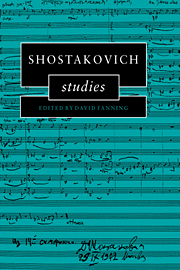Book contents
- Frontmatter
- Contents
- Acknowledgments
- 1 Introduction. Talking about eggs: musicology and Shostakovich
- 2 Public lies and unspeakable truth interpreting Shostakovich's Fifth Symphony
- 3 Form in Shostakovich's instrumental works
- 4 Russian theorists on modality in Shostakovich's music
- 5 The cycle of structure and the cycle of meaning: the Piano Trio in E minor, Op. 67
- 6 Leitmotif in Lady Macbeth
- 7 From Lady Macbeth to Katerina Shostakovich's versions and revisions
- 8 The Golden Age: the true story of the première
- 9 ‘And art made tongue-tied by authority’ Shostakovich's song-cycles
- 10 A debt repaid? Some observations on Shostakovich and his late-period recognition of Britten
- 11 Shostakovich and Schnittke: the erosion of symphonic syntax
- Index
4 - Russian theorists on modality in Shostakovich's music
Published online by Cambridge University Press: 22 October 2009
- Frontmatter
- Contents
- Acknowledgments
- 1 Introduction. Talking about eggs: musicology and Shostakovich
- 2 Public lies and unspeakable truth interpreting Shostakovich's Fifth Symphony
- 3 Form in Shostakovich's instrumental works
- 4 Russian theorists on modality in Shostakovich's music
- 5 The cycle of structure and the cycle of meaning: the Piano Trio in E minor, Op. 67
- 6 Leitmotif in Lady Macbeth
- 7 From Lady Macbeth to Katerina Shostakovich's versions and revisions
- 8 The Golden Age: the true story of the première
- 9 ‘And art made tongue-tied by authority’ Shostakovich's song-cycles
- 10 A debt repaid? Some observations on Shostakovich and his late-period recognition of Britten
- 11 Shostakovich and Schnittke: the erosion of symphonic syntax
- Index
Summary
Russian music theorists have been focusing on the question of modality in Shostakovich's music since at least the years 1944–5, when the two earliest articles on this topic were written. However, the majority of works on mode in Shostakovich were written between the years 1966 and 1980. The study of mode itself, though, has a much longer history in the development of Russian music theory; mode in fact constitutes one of the most important subjects within that discipline. Thus a brief definition of mode, a history of its development and an introduction to some of the issues in Russian modal theory pertinent to the analysis of Shostakovich's modal language are herein presented as a form of prolegomenon to the discussion of mode in Shostakovich's music.
DEFINITION
In Russian music theory, the concept of mode forms one of the major and most important tenets upon which that theory is based. In its broadest interpretation, the Russian concept of mode has no exact equivalent in western music theory. The western idea of mode – the Greek modes, medieval or church modes, or folk modes, i.e., melodic scale patterns outside the major-minor tonal system – corresponds to just one of the separate elements making up the complex theoretical system that is mode in Russian music theory. According to theorist Yuriy Kholopov, in its widest application mode embraces the idea of the organic coherence of the musical material employed:
- Type
- Chapter
- Information
- Shostakovich Studies , pp. 76 - 112Publisher: Cambridge University PressPrint publication year: 1995
- 12
- Cited by



